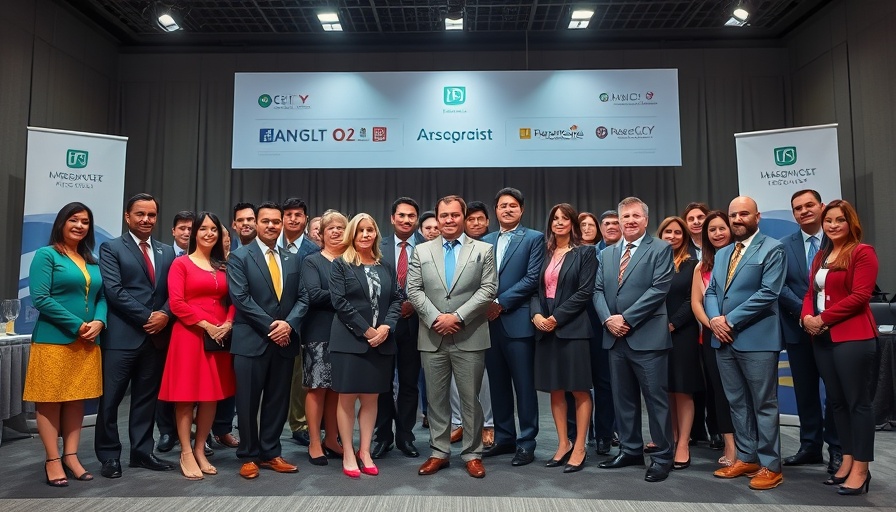
Understanding the Stakes: The 2025 Africa Natural Resources and Energy Summit
The recent Africa Natural Resources and Energy Summit held in Abuja has raised the bar for discussions around the continent's vast potential. This gathering, convened under the theme "Announcing Local Content for Sustainable Development," brought together ministers, state officials, industry players, and international representatives who are committed to leveraging Africa's natural wealth. The discussions aimed not only to unlock investments but also to ensure these efforts translate into tangible benefits for the continent.
In 'Stakeholders at Africa Natural Resources and Energy Summit Call for Industrialization,' the discussions illuminate Africa's path toward harnessing its natural wealth for sustainable growth. Here, we explore key insights that emerged from this critical summit.
Goal Setting: The Need for Industrial Development
One of the major takeaways from the summit is the importance of transitioning from a resource-rich continent to a value-producing powerhouse. The summit underscored the need to shift investments towards industrialization—an essential step to harnessing the continent's mineral resources effectively. There was a clear consensus that Africa can no longer be merely a supplier of raw materials, as this approach has historically limited its growth and development. The establishment of the African Mineral Strategy Group serves as a testament to this commitment, aiming to foster critical mineral development and promote collaborative frameworks among member states.
Decarbonization and Decentralization: Charting New Terrains
As the world grapples with challenges like climate change and energy sustainability, the summit highlighted Africa's response to these trends. The focus on renewable energy and sustainable practices illustrated that Africa can lead the charge in decarbonization efforts. Stakeholders emphasized technology transfer and local industrialization as essential factors to achieve long-term self-reliance. This entails building local capabilities that do not only fuel economic growth but also safeguard the environment.
Addressing Local Content Implementation
There was particular emphasis on the need for local content to evolve from being just a policy concept to measurable outcomes. Officials from Nigeria expressed their determination to ensure these policies are not merely encouraged in discussions but rigorously applied. With tangible indicators to measure economic growth, industrial capacity, and energy security, Nigeria is aiming for a framework that encourages genuine partnerships. This shift is crucial as the summit’s attendees acknowledged that the path to Africa's development is not solely about seeking foreign investments, but rather welcoming partners who view Africa as a hub for innovation.
A Typology of Partnerships: Key to Effective Resource Management
Throughout the summit, it became apparent that forging strategic partnerships will be pivotal in navigating Africa's resource management landscape. Engaging with both public and private sectors while ensuring alignment with local communities is essential for fostering trust and cooperation. By establishing this typology of partnerships, the aim is to develop a robust framework that prioritizes local gain over external exploitation.
Exhibitions and Innovations: Showcasing African Ingenuity
The event also allowed for exhibitions showcasing innovative extraction technologies and value chain developments tailored for Africa. Innovations highlighted include advancements in renewable energy and extraction technologies which could redefine how resources are harnessed. This emphasis on local ingenuity serves to inspire confidence within Africa, showcasing that solutions to its challenges are often found within its borders.
Conclusion: A Continent on the Verge of Transformation
As stakeholders wrap up discussions from the Africa Natural Resources and Energy Summit, one message resonates loud and clear: Africa's natural resources must serve the interest of its people first. The commitment to sustainable development and industrialization marks a new era for the continent—one where global partnerships are built not just on extraction but on shared innovation and growth.
Africa stands at a precipice of change, poised to redefine its narrative in the global economy. As we look forward to the outcomes of this summit, it is crucial for each African nation to continue championing policies that ensure their resources translate into lasting local benefits. In a continent enriched with natural wealth, the time has come for actionable insights and strategic measures that transform potential into prosperity for all.
 Add Row
Add Row  Add
Add 


Write A Comment